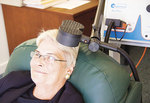Magnetic hold over depression
 Psychiatry Psychiatry
A University of Adelaide study has found that mild and repeated doses of magnetic brain stimulation can be an effective treatment for chronic depression. Psychiatry Professor Cherrie Galletly said 38 patients with a major depressive disorder had shown a clear improvement after undertaking treatment with magnetic brain stimulation for 30 minutes at a time. "At the start of the study, all participants met the criteria for moderate to severe depression and most had contemplated suicide," Professor Galletly said. "After treatment, 12 patients had made a full recovery and many others showed significant improvement. A six-month follow-up of 11 patients showed the improvement was sustained." The ongoing study, conducted at the Adelaide Clinic, involves people who have severe, long-term depression lasting up to 20 years. In 87% of cases, the participants had trialled five or more antidepressants. "Preliminary results indicate that 12 transcranial magnetic stimulation (TMS) treatments, given three days a week over a month, may be sufficient to achieve good results," Professor Galletly said. The procedure involves placing an electromagnetic coil near the frontal cortex of a patient's scalp for half an hour. The magnetic energy stimulates the region of the brain that is involved in mood regulation and depression. "The advantages of TMS are that, unlike electro convulsive treatment, no anaesthetic is required and there is no associated cognitive impairment," Professor Galletly said. "The only side effects that patients have experienced are slight headaches due to the effect of the pulsing magnet on their scalp. This can be alleviated with a simple headache tablet." Professor Galletly said there were no medications involved with the procedure. However, most patients are taking antidepressants and can remain on these during TMS treatment. Only people referred by a psychiatrist are accepted for treatment and TMS is restricted to people with private health cover - it is not reimbursed by Medicare at this stage. Although TMS has been available in the United States and Europe for some time, the procedure has only been available in South Australia in the past 12 months. "There has been a lot of interest from psychiatrists in Australia because it has been a long time since we have seen new treatments for depression. This is a very exciting development for the profession," Professor Galletly said. Story by Candy Gibson
|





